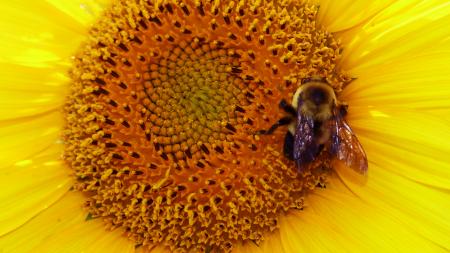An interdisciplinary team of researchers at the University of Massachusetts Amherst, led by Lynn Adler, professor of biology, has been awarded $2.4 million from the National Science Foundation (NSF) to trace how food affects the ability of pathogens to attack plant pollinators. The research will be the first conducted across a wide range of scales, from the molecular to the community-wide, and has immediate implications for ecosystems, including agricultural efforts, worldwide.
One of the biggest challenges in biology today is to understand and manage how pathogens travel and proliferate. One place of special concern is the way that pathogens have affected, and are devastating, plant pollinators—think of bees, for instance, which have faced waves of die-offs over the past decade, in part due to specific pathogens, including Crithidia bombi. Since insect pollinators are annually responsible for ecosystem services estimated at well over $200 billion worldwide, their decline has raised serious concern, leading some to call the situation the “insect apocalypse.”
Yet, biologists don’t have a clear understanding of what role plants play in the pathogen-pollinators interaction, nor is it entirely known what role the quantity and quality of food available to the pollinators may play in the pollinators’ ability to withstand disease. While flowers provide essential food for pollinators, biologists often don’t consider how they can also be sites where diseases are transmitted, as well as how nectar and pollen themselves may help pollinators fight off disease.
“Our ultimate goal with this grant,” says Adler, “is to figure out what sort of plant composition, available as food sources for the pollinators, reduces infection?”
Adler, who specializes in understanding the interactions between plants and insects, has previously shown that certain types of food can help pollinators resist disease. In particular, sunflower pollen seems to be something of a super food. But why?
To answer this question, Adler has assembled a multidisciplinary team of scientists—from ecologists to mathematical modelers, molecular biologists to biochemists—whose expertise will open a window into how food affects health with an unprecedented comprehensiveness. For the first time, researchers will be studying the molecular, cellular, organismal, species and community-level interactions of food, pollinator and pathogen.
At the same time, Adler and her colleagues will launch a training program, aimed at graduate students, as well as an after-school program tailored for middle-school girls in under-served communities. The goal will be to help develop a diverse new generation of up-and-coming biologists and ecologists.
Photo Credit: Justin Roch
